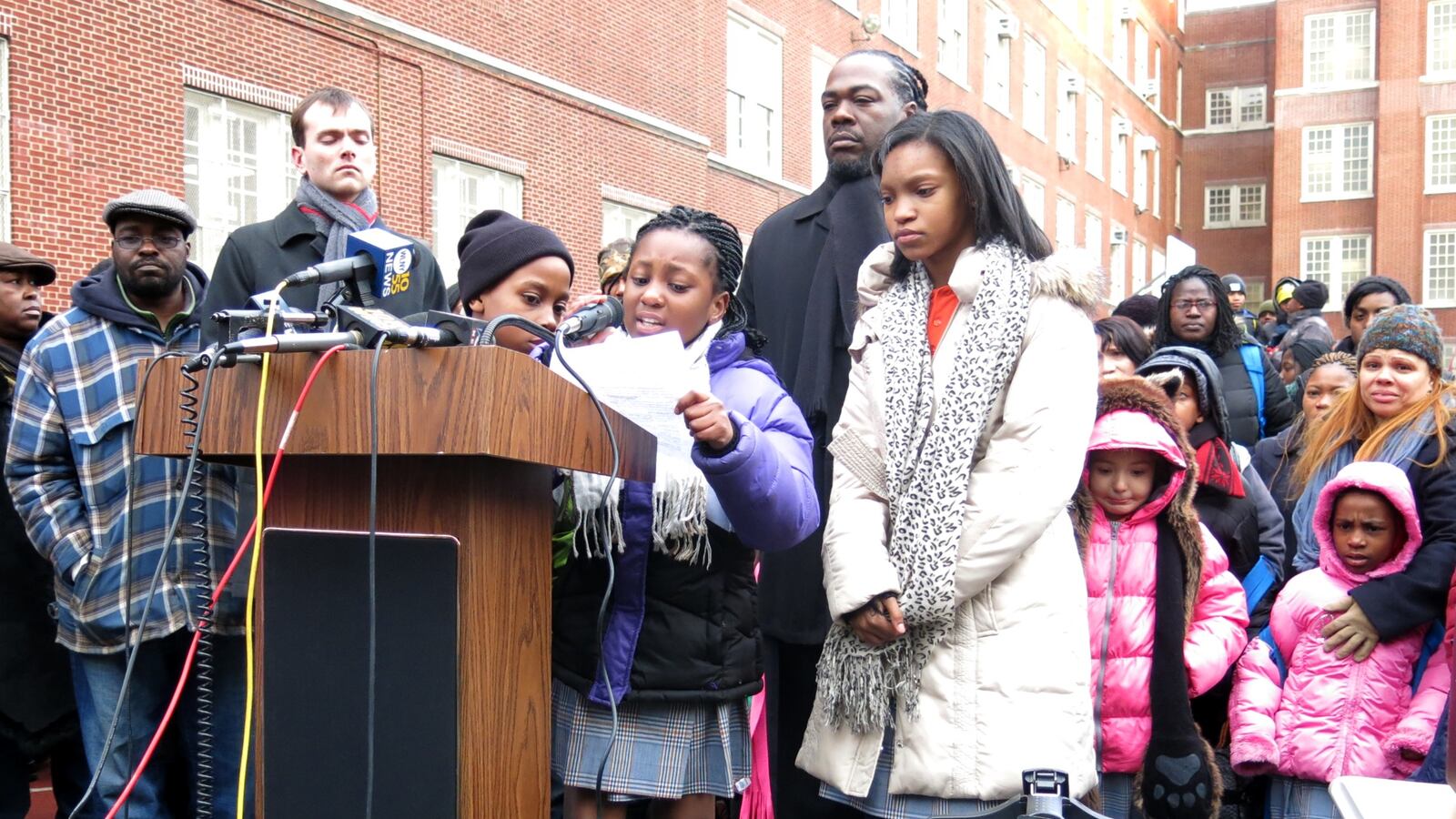The city’s reversal of space-sharing plans includes a growing middle school whose fifth and sixth graders might have to start looking for a new school soon.
The school, Harlem Central Success Academy, is the only reversal among the six announced today that currently has students. The other five schools that lost space would have been brand new next year and hadn’t even accepted student applications yet.
As a result, Harlem Central is without a home when the year ends, since its current siting at a different building expires in June. It’s a situation that has sparked the most outrage from the Success Academy Charter School network, which also lost city-owned space for two elementary schools planned to open next year.
The network, led by CEO Eva Moskowitz, quickly mobilized parents to a nearby school this afternoon for a meeting and press conference to blast the de Blasio administration’s decision.
“I come all the way from the Bronx…where the schools there are failing,” said Marion Fleming, a father whose son is a sixth grader at Harlem Central. “God knows that de Blasio can not do this.”
Last year, Harlem Central’s 51 fifth graders were the top-scoring academic cohort in the state on Common Core-aligned math tests, with more than 80 percent of students scoring proficient or above. Of the school’s 120 students, 78 percent qualify for lunch subsidies and 14 percent have Individualized Education Plans.
Since last year, Harlem Central has been temporarily housed at 21 West 111th Street, a school building that includes two magnet elementary schools looking to expand, a charter school and a District 75 program. Its co-location plan at the building is set to expire at the end of the school year and the new plan, approved late last year by the Bloomberg administration, was to continue expanding grades at another site about five blocks north.
But with that plan nixed, the school’s future is uncertain. It could possibly move into extra classroom space available at other Success sites. Another option is to secure private space, something that Success’ well-heeled backers could afford to pay for. But since she founded her first school in 2006, Moskowitz has argued that operating in private space, without extra facilities funding, was unfair because charter school students don’t receive any more per-pupil funding from the state.
“Public schools do not pay rent and we can not have a discriminatory policy,” Moskowitz said today when asked whether she would be willing to pay rent to stay in the building.
In a meeting with parents in an auditorium before the press conference, Moskowitz forecast the worst-case scenario, telling them that their school could cease to exist entirely.
“It’s going to be close,” Moskowitz said. The mayor just announced today that he’s going to close our beloved school.”
The network is planning to close its 22 schools on Tuesday and bus students, teachers and parents up to Albany for a large charter school rally that is focused on getting the attention of state lawmakers. Moskowitz did not respond directly when asked what she thought they could do about the co-location decisions, other than to say “we need political leadership.”
For de Blasio, a political opponent of Moskowitz since their days in the City Council, his decision has also drawn heat from his allies, though for opposite reasons.
City Council Speaker Melissa Mark-Viverito, who is suing the city over the co-locations, said in a statement that she was “concerned” as how few of the plans were reversed, according to Politicker. And three City Council members with planned charter co-locations moving forward in their districts, sent out a statement saying they were “furious.”
“I am extremely disappointed in the decision to allow the co-location of a charter school at I.S 96 (the Seth Low School) that our district does not need or want,” Council member David Greenfield said in a statement, referring to a plan for a new Success elementary school that was not reversed. “This co-location will come at the expense of the school’s dedicated staff and hard-working students.”
De Blasio defended the decision in a statement, saying that it was the best one he could make given the circumstances. De Blasio inherited dozens of the co-location plans that were passed just months before he took office, and although he made his opposition to them clear, he said today that it would have been difficult to reverse more plans.
“We were handed a series of last minute moves by the Bloomberg administration approving a number of co-locations in a way that I think was ill advised,” he said.
Correction: A previous version misstated the percentage of Success who scored proficient on state tests last year.

